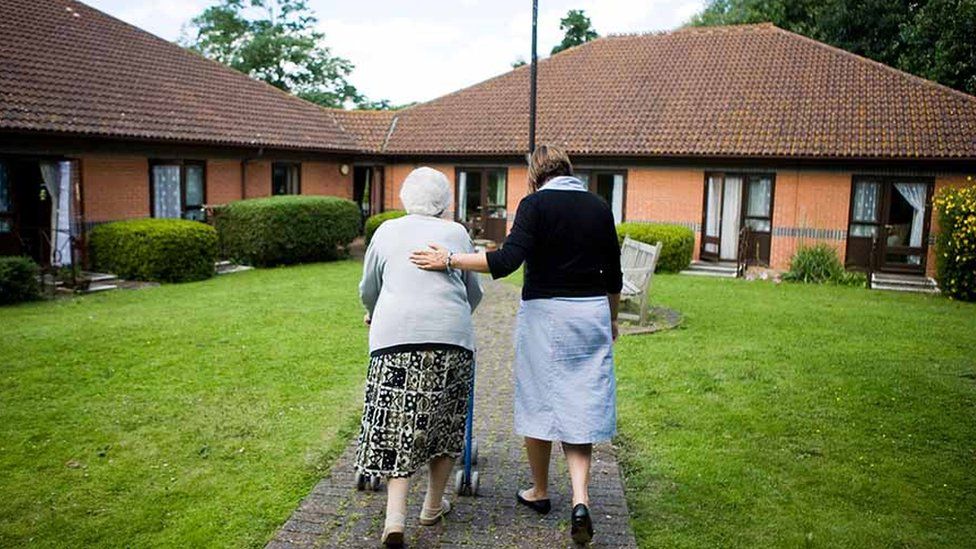
Providers have warned of escalating care home closures if a key contract is not agreed
Closures of care homes could escalate rapidly if a key contract is not agreed, care providers have said.
Scottish Care said the contract with Cosla, which sets weekly care home fees, is no longer viable because of rising costs and recruitment problems.
Cosla said the latest offer was at the “limits of affordability”.
However Scottish Care said this was not enough to cover costs, such as paying care staff £12 an hour – which the Scottish government has committed to.
It said financial pressures have recently prompted the largest number of care home closures ever seen and warned of more if the contract is not settled.
Contract offer rejected
The National Care Home Contract (NCHC) was set up about 15 years ago in response to disputes over rates between care homes, local and central government.
Those fees are now set through annual negotiation between Scottish Care, which represents private and charity providers, and Cosla, which represents local authorities.
The contract also caps profits at 4%.
If it ends, Scottish Care said providers would be entitled to charge what they consider is necessary to meet their costs.
They could also refuse to keep accommodating local authority-funded residents or refuse any new residents.
Since January, two offers to renew the contract have been made by Cosla which have been rejected by care home providers.
The latest offer was an increase of 6% to fees.
Scottish Care said it wanted to pay care workers at least £12 per hour and pay other workers the National Living Wage.
It also said care homes needed to meet costs including energy bills that had risen sharply, and the offer was not enough to cover this.
In the meantime, the NCHC temporary rates for residential and 24/7 nursing care are £855 per week for a nursing home and £739 for a residential care home.
‘Real urgency’
Scottish Care added the contract is based on an outdated model – and because care homes have taken on an increased role in the community, costs cannot be covered in the same way.
More recently, it said it has become more difficult to recruit and retain staff because of the pay rise given to NHS care staff.
Last month the BBC heard from nurses and carers who said they were leaving social care for better wages in the NHS and overseas.
In a media statement, Scottish Care said: “Our care homes are at a critical juncture. We need to all work together to preserve the NCHC and to ensure continued care and support is possible in a local care home.
“The loss of the NCHC will result in the closure of many more care homes across the country most especially in rural and remote communities and even more importantly will cause huge damage and distress to hundreds of care home residents.
“There is a real urgency to save Scotland’s care homes.”
Councillor Paul Kelly, Cosla’s health and social care spokesperson said the latest offer for the NCHC was shaped by severe financial pressures and inflation.
He said it was the “best offer we can make and is at the limits of affordability”.
He added: “We understand that as part of Scottish Care’s rejection of this offer there was direct engagement with Scottish government in relation to the financial challenges across the sector.
“Meanwhile, councils have continued to ensure payments are timeously made to care home providers, including to enable adult social care workers to receive the Real Living Wage. The full offer remains on the table.”
The government has managed to find over £500m to fund pay rises for NHS nurses, paramedics and other healthcare workers.
And if junior doctors accept a new pay offer, it has committed to using £60m of the health and social care budget to pay for that.
The first minister has said social care workers would see their pay rise to £12 an hour, but so far there has been no indication of when that will happen or where the funds will come from.
Skilled care staff keep people out of hospital and ease the pressure on the NHS, but there are not enough of them available to meet growing demand.
There is concern that higher pay within the NHS as well as other opportunities might also tempt people away.
The warning from Scottish Care as well as other organisations is that without improved pay and conditions they won’t be able to hold on to staff, and they say it will have devastating consequences for a system close to collapse.
The Scottish government has committed to the £12 per hour wage increase, though no timeline has been set to deliver this.
Social Care Minister Maree Todd told the BBC she was concerned about care home closures and was keen to stabilise “market failure”.
Although the Scottish government is not at the negotiating table for the NCHC, Ms Todd said it was in everyone’s interests to find a solution and the government was keen to work with both sides.
She said: “We have been aware that that negotiation has broken down for a number of weeks now and we are trying to help find a way forward in that challenge.
“The biggest thing that would stabilise the market is working on the pay and conditions of the people who work in social care.”








